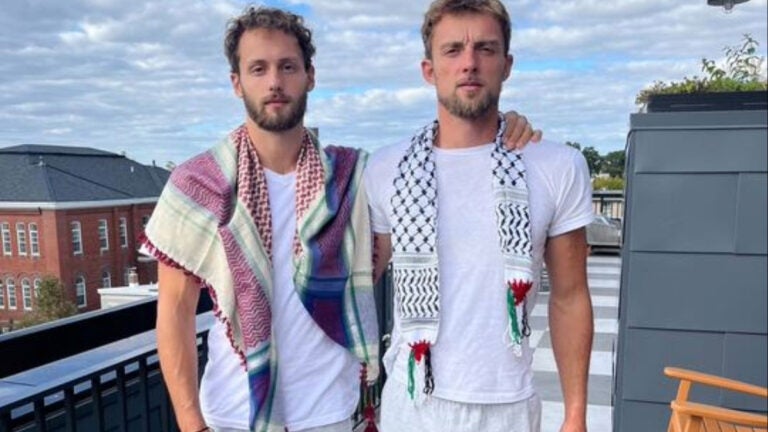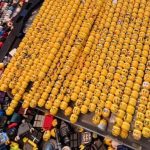Local News
The two brothers, both from Sheffield, were held in an Israeli prison for several days before their release earlier this month.

Adnaan and Tor Stumo, the two Massachusetts men who were detained by Israeli forces while aboard a volunteer flotilla bringing humanitarian aid to Gaza, were released earlier this month. The same day they returned home to the United States, a ceasefire deal between Israel and Hamas officially came into effect.
The brothers, who grew up in a political family, aren’t new to activism, especially not for Palestine. Ralph Nader, a lawyer and political activist, is their great uncle.
Though the brothers told Boston.com that they didn’t prioritize their pro-Palestinian activism over their other protest work early on, they were heavily influenced by the death of their sister, Samya Stumo, who was “very involved” with Palestine.
When war broke out in Gaza after the Oct. 7 attacks, the brothers took their activism to a new level, fighting in Washington, D.C., to block weapons shipments and funding for Israel. Adnaan and Tor both have extensive maritime experience, so when they were asked to join the Global Sumud Flotilla in August, they took a chance.
En route to Gaza, all 42 of the flotilla’s vessels were intercepted. The volunteers, including Adnaan and Tor, were detained by Israeli forces and brought to the port of Ashdod before being taken to Ketziot prison in the Negev desert. They were held there for several days, many of them on hunger strikes, in poor conditions, before their eventual release.
Since their release, many details about what happened to the volunteers have remained unclear. In an in-depth interview with Boston.com, the Stumo brothers shared their experiences, all the way from the interception of their vessels in international waters to their eventual release.
The following interview has been edited for length and clarity.
What exactly happened when the flotilla was intercepted?
Tor: It was different on every vessel. Some boats, like mine, the “Huga,” had a fiberglass hull. There was an Israeli military vessel circling us, jamming our comms, shining a spotlight on us, and we knew that if they decided to ram us or stop right in front of us, and we hit them, we could sink. We slowed down very quickly, and they boarded us. But, Adnaan’s vessel was very different.
Adnaan: The difference was they came and hit us right away with spotlights and with high pressure water cannons. We had no autopilot on my boat, so everybody was trained to get up on deck and prepare for interception. Nobody wanted to provide any kind of excuse for them to fire on us. I had a couple of female participants on board who got injured by that spray of the water cannon from close range. I mean, it threw a couple of us across the deck. It pounded me in the back of the head, whacked my head right into the steering wheel, and I lost vision, saw stars. It was no fun, but we did endure it for a while because we didn’t want to just capitulate right away.
What happened when you got to the port of Ashdod?
Tor: We had no idea what would happen. This was unprecedented; we had more boats as part of our flotilla than all of the previous flotillas combined. We had an idea of what had happened with previous ones, but this was so different, we had no reasonable expectation of what would happen.
I got off the boat, and I said, “I don’t want to give up my passport to you. I have it here, but I want consular assistance or legal representation first.” They did not like that at all. They took my passport, they zip-tied me, put me on the dock, they chained my ankles, they chained my arms behind my back. After processing, they blindfolded me, handcuffed my hands behind my back, put me on a prison bus, and as I got up the stairs … Adnaan saw this happen. Four or five soldiers or military prison guards beat me, punching me in my stomach, my back, all around my torso, and they clubbed me on the back of the neck. They threw me into a solitary cell on the bus and they left me there.
Adnaan: The bus had a big cage on the back for about 20 people, and then they had maybe four or five cages in the front for two to four people. They shoved [Tor] in there, and I didn’t see him until he got thrown in the jail cell with me later.
Tor: I was squirming, changing positions because my cuffs were tight. They were really cutting into my wrists. When I got them in a position where they weren’t cutting so much, it was hard on my shoulders, so I was kind of ping-ponging between muscle spasms in my shoulders and cutting up my wrists.
When I got off the bus, they took off my handcuffs and they put a new pair on, and I wasn’t ready for that. I thought they were just going to take off my blindfold. They put these ones on very, very tight, and I couldn’t feel my hands very, very quickly after that. You know when some part of your body falls asleep, and you get that buzzing, you get that tingling in your hand? For me, it was like a swarm of bees was in my hand, and I was very, very nervous. I started to see stars, my vision started to black out, and then I woke up on the floor.
Fifteen to 20 minutes later, they took off my blindfold, took off the handcuffs, put me in a cell. When they took off the handcuffs, I continued to feel absolutely nothing all the way from my left thumb all the way down to my wrist, and I still have nerve damage there. I don’t have full sensation back yet.
During your time in prison, you were both on hunger strikes. How did that affect your experiences?
Tor: We all said we can’t accept food from an entity that is starving hundreds of thousands, millions of Palestinians, but we wanted to eat after a day or two. You get real hungry and you get real tired. If you don’t pace yourself when you stand up, you see stars, and you get very light-headed. And often, they wouldn’t let us sleep. They would come in at all hours in the night with shotguns, with dogs, with riot shields, laser scopes pointed right in your face. You wouldn’t know what was happening. Sometimes they just wanted to count. Sometimes it would be to move us from one cell to the other.
Were you able to see your lawyers at any point?
Tor: I didn’t meet a single person who saw a lawyer, and we asked at every opportunity.
Adnaan: At the end of the day, lawyers and consular assistance and medical assistance were essentially non-existent.
Tor: We did eventually see our people from our consul. To call them useless would be a generous compliment. Our consular people said, “You better sign this waiver that the Israelis are asking you to sign. You better sign it, because if you don’t, you’ll have to have a deportation hearing with a judge and a lawyer, and who knows how long that’ll take?” Now, we knew at the time that was almost certainly false, because we had already seen a judge. We already did this deportation hearing. They said, “No, you need to do another one with a judge, with the lawyer, and we don’t know how long that will take.” People had already been deported from Israel without that second hearing, to our knowledge.
Adnaan: Bottom line, they just lied. They lied completely.
Tor: No one ever had that second hearing. No one did.
What happened when you eventually got out?
Adnaan: There was an unprecedented amount of support from the land side. Not only were there calls to all of our governments and blockades of the consulates and the embassies in dozens of countries … but there was also just a massive amount of pressure in terms of blocking weapons.
Tor: This flotilla allowed [people] the vehicle to try to transmit and make understood their horror, their demands. They were all aligned around a very, very simple demand: Do not allow the war crime of seizing and stealing humanitarian aid on the way to a starving population. A year ago, having warships from Spain, two warships from Italy, a warship from Greece, a warship from Turkey, it would have been absolutely unthinkable a year ago, and that all happened with our flotilla. It’s not because of us, but it’s because … people need an outlet. People feel so hopeless. They need a channel for their pain and their desire to help. That galvanized people, and it scared a lot of the governments who are complicit.
Now that a ceasefire deal has been reached, what comes next for you both?
Adnaan: We, of course, have to welcome the reprieve. At the same time … it’s very hard to credit without seeing any kind of addressing of the circumstances that have forced people to revolt. … I would say since 1948, but it’s much deeper than that. If there’s to be real peace in Palestine, it has to come with real rights for everybody.
Tor: Authoritarianism is everywhere, and the technology of authoritarianism is currently being grown and tested in human trials on a captive population in Gaza and the West Bank by Israel. The technology that is being produced from these human trials is being exported to authoritarian regimes all over the world, including ours. We have [Immigration and Customs Enforcement] roaming our streets. We have the National Guard, and the techniques and the technologies they are using come from Israel and are being used on us. So, as long as we fund and support this laboratory of authoritarianism, it will come back to us. If nothing else, if we are not concerned for the life and human rights of other people, we should at least be concerned for our own human and civil rights as U.S. citizens.
Adnaan: Of course, there will be another flotilla. We are committed to supporting the ability of people to get what they need. We are going to need to fight hard to be able to get them even the basic heavy equipment and materials that they need to rebuild, let alone anything else.
It doesn’t end here, does it?
Tor: The peace deal is just words. All the universities in Gaza are still destroyed. Most of the housing is still gone. What has changed? Until the people of Gaza have the right to determine their own destinies … we cannot stop. History has shown us that in Gaza, in the West Bank, and in Palestine, the people there have been continuously killed, starved, and moved out of their homes. Until they have control over their own lives, that will not change.
Sign up for the Today newsletter
Get everything you need to know to start your day, delivered right to your inbox every morning.



